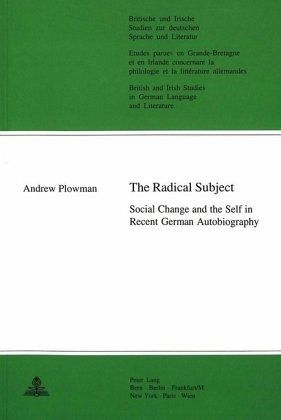Nicht lieferbar

The Radical Subject
Social Change and the Self in Recent German Autobiography
Versandkostenfrei!
Nicht lieferbar
This study offers an examination of key autobiographical texts arising from the student movement and the New Women's Movement in the Federal Republic of Germany during the 1960s and 1970s. Existing critical debates about the 'New Subjectivity' of the 1970s, it argues, fail to do justice to the issue of autobiographical writing in German literature after 1968. By contrast, this book makes the case for an interdisciplinary approach to Bernward Vesper's Die Reise , Rolf Dieter Brinkmann's Erkundungen zur Präzisierung des Gefühls , Karin Struck's Klassenliebe , Inga Buhmann's Ich habe mir eine G...
This study offers an examination of key autobiographical texts arising from the student movement and the New Women's Movement in the Federal Republic of Germany during the 1960s and 1970s. Existing critical debates about the 'New Subjectivity' of the 1970s, it argues, fail to do justice to the issue of autobiographical writing in German literature after 1968. By contrast, this book makes the case for an interdisciplinary approach to Bernward Vesper's Die Reise , Rolf Dieter Brinkmann's Erkundungen zur Präzisierung des Gefühls , Karin Struck's Klassenliebe , Inga Buhmann's Ich habe mir eine Geschichte geschrieben and Verena Stefan's Häutungen which is able to illuminate these texts both as historical documents and as contributions to the genre of autobiography. The textual analyses at the heart of the study explore the often complex, yet always fascinating relationship between autobiographical practices and the politics of the student and the feminist movements in the Federal Republic.



